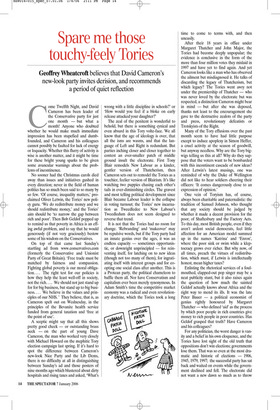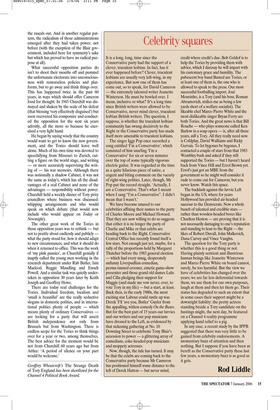Spare me those touchy-feely Tories
Geoffrey Wheatcroft believes that David Cameron’s new-look party invites derision, and recommends a period of quiet reflection Come Twelfth Night, and David Cameron has been leader of the Conservative party for just one month — but what a month! Anyone who doubted whether he would make much immediate impression has been stupefied and dumbfounded, and Cameron and his colleagues cannot possibly be faulted for lack of energy or loquacity. Whether this flurry of activity is wise is another matter, and it might be time for these bright young sparks to be given some avuncular warnings about the problems of incontinence.
No sooner had the Christmas carols died away than issues and initiatives gushed in every direction; never in the field of human politics has so much been said to so many by so few. ‘Of course, inequality matters,’ proclaimed Oliver Letwin, the Tories’ new policy guru. ‘We do redistribute money and we should redistribute money,’ and the Tories’ aim should be ‘to narrow the gap between rich and poor’. Then Bob Geldof popped up to remind us that poverty in Africa is an effing awful problem, and to say that he would generously (if not very graciously) bestow some of his wisdom on the Conservatives.
On top of that came last Sunday’s startling ad from www.conservatives.com (formerly the Conservative and Unionist Party of Great Britain). ‘Free trade must be matched by fairness and compassion. Fighting global poverty is our moral obligation.... The right test for our policies is how they help the least well-off in society, not the rich.... We should not just stand up for for big business, but stand up to big business.... We believe in the values and principles of our NHS. ’ They believe, that is, as Cameron spelt out on Wednesday, in the principles of the Bevanite health service funded from general taxation and ‘free at the point of use’.
A sceptic might say that all this shows pretty good cheek — or outstanding brass neck — on the part of young Dave Cameron, the man who worked very closely with Michael Howard on the mephitic Tory election campaign last spring. If it’s hard to spot the difference between Cameron’s new-look Nice Party and the Lib Dems, there is no difficulty at all in distinguishing between Sunday’s ad and those posters of nine months ago which blustered about dirty hospitals and rising taxes and asked, ‘What’s wrong with a little discipline in schools?’ or ‘How would you feel if a bloke on early release attacked your daughter?’ The zeal of the penitent is wonderful to behold, but there is something cynical and even absurd in this Tory volte-face. We all know that the age of ideology is over, that all the isms are wasms, and that the language of Left and Right is redundant. But parties inching closer and closer together to contest an ever-smaller patch of middle ground insult the electorate. First Tony Blair remodels New Labour as a kinder, gentler version of Thatcherism, then Cameron sets out to remodel the Tories as a touchier, feelier version of Blairism. It’s like watching two puppies chasing each other’s tails in ever-diminishing circles. The gravest and most telling political development since Blair became Labour leader is the collapse in voting turnout; the Tories’ new incarnation as Tweedledee to New Labour’s Tweedledum does not seem designed to reverse that trend.
It is not that the Tories had no room for change. ‘Rebranding’ and ‘makeover’ may be repulsive words, but if the Tory party had an innate genius over the ages, it was an endless capacity — sometimes opportunistic, or downright unprincipled — for reinventing itself, for latching on to new ideas (though not too many of them), for ingratiating itself with interest groups and for coopting one social class after another. This is a Protean party, the political chameleon to baffle them all. Nor have Conservatism and capitalism ever been merely synonymous. In Adam Smith’s time the competitive market economy was a radical and even revolutionary doctrine, which the Tories took a long time to come to terms with, and then uneasily.
After their 18 years in office under Margaret Thatcher and John Major, the Tories had become deeply unpopular; the evidence is conclusive in the form of the more than four million votes they mislaid in 1997 and have yet to find again. And yet Cameron looks like a man who has observed the ailment but misdiagnosed it. He talks of discarding the legacy of Thatcherism, but which legacy? The Tories went awry not under the premiership of Thatcher — who was never loved by the electorate but was respected, a distinction Cameron might bear in mind — but after she was deposed, thanks not least to the encouragement she gave to the destructive zealots of the party and press, revolutionary defeatists or Trotskyists of the Right.
Many of the Tory effusions over the past month seem to have had little purpose except to induce apoplexy in Simon Heffer, a cruel activity at the season of goodwill, but anyway needless. Why are the Tory bigwigs telling us this at all? Why do they suppose that the voters want to be bombarded with this incontinent cascade of new ideas? After Letwin’s latest musings, one was reminded of why the Duke of Wellington did not like to hear soldiers cheering their officers: ‘It comes dangerously close to an expression of opinion.’ One vein of Toryism has, of course, always been charitable and paternalistic: the tradition of Samuel Johnson, who thought that any society should be judged by whether it made a decent provision for the poor; of Shaftesbury and the Factory Acts. To this day, most British people, even if they aren’t ardent social democrats, feel little affection for an American model summed up in the names ‘Katrina’ and ‘Enron’, where the poor sink or swim while a kleptocracy grows ever richer. But why now, of all times, preach the virtues of redistribution, which must, if Letwin is intellectually honest, mean higher taxes?
Enlisting the rhetorical services of a foulmouthed, clapped-out pop singer may be a neat publicity stunt, but it also raises again the question of how much the sainted Geldof actually knows about Africa and the right way to mend its ills. It was the late Peter Bauer — a political economist of genius rightly honoured by Margaret Thatcher — who defined ‘aid’ as the process by which poor people in rich countries give money to rich people in poor countries. Has Geldof grasped that truth? Have Cameron and his colleagues?
For any politician, the worst danger is vanity and a belief in his own eloquence, and the Tories have lost sight of the old truth that oppositions don’t win elections; governments lose them. That was so even at the most dramatic and historic of elections — 1906, 1945, 1979, 1997; the successful party has sat back and waited on events while the government declined and fell. The electorate did not want a new dawn so much as to throw the rascals out. And in another regular pattern, the radicalism of those administrations emerged after they had taken power, not before (with the exception of the Blair government, included here for symmetry’s sake but which has proved to have no radical purpose at all).
What successful opposition parties do isn’t to shoot their mouths off and pummel the unfortunate electorate into unconsciousness with remorseless policies and platforms, but to go away and think things over. This has happened twice in the past 60 years, in ways which should offer Cameron food for thought. In 1945 Churchill was dismayed and shaken by the scale of his defeat (that blessing ‘very effectively disguised’) but soon recovered his composure and conducted the opposition for the next six years adroitly, all the more so because he exercised a very light hand.
He began by saying wisely that the country would want to get to know the new government, and the Tories should leave well alone. Much of his own time was devoted to speechifying from Missouri to Zurich, cutting a figure on the world stage, and writing — or more accurately supervising the writing of — his war memoirs. Although there was notionally a shadow Cabinet, it was not the same as today’s, which has all the disadvantages of a real Cabinet and none of the advantages — responsibility without power. Churchill held a weekly dinner of Tory privy councillors where business was discussed: whipping arrangements and who would speak on which debate (that would now include who would appear on Today or Newsnight).
The other great work of the Tories in those opposition years was to rethink — but not to prattle about endlessly and publicly what the party stood for, how it should adapt to new circumstances, and what it should do when it returned to office. This was the work of ‘my pink pansies’, as Churchill genially if inaptly called the young men working in the research department under Rab Butler, Iain Macleod, Reggie Maudling and Enoch Powell. And a similar task was quietly undertaken in opposition 30 years later by Keith Joseph and Geoffrey Howe.
There are today real challenges for the Tories. Individual freedom, localism and ‘small is beautiful’ are the really seductive slogans in domestic politics, and in international politics plenty of people — which means plenty of ordinary Conservatives are looking for a party that will assert British independence not only from Brussels but from Washington. There is endless scope for the Tories to think things over for a year or two, among themselves. The best advice for the moment would be not from Churchill 60 years ago but from Attlee: ‘A period of silence on your part would be welcome.’ Geoffrey Wheatcroft’s The Strange Death of Tory England has been shortlisted for the Channel 4 Political Book Award.






































 Previous page
Previous page